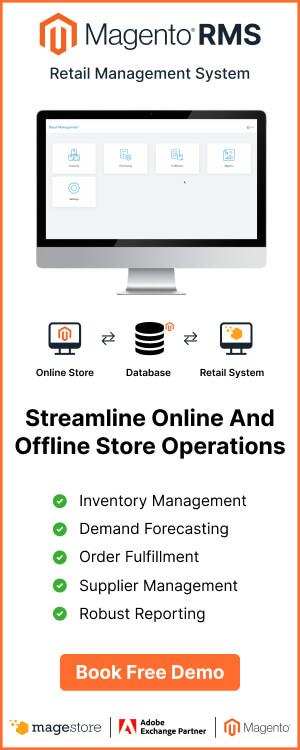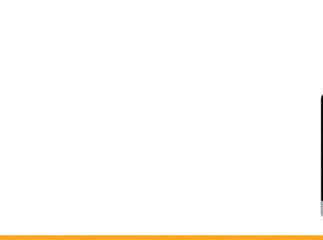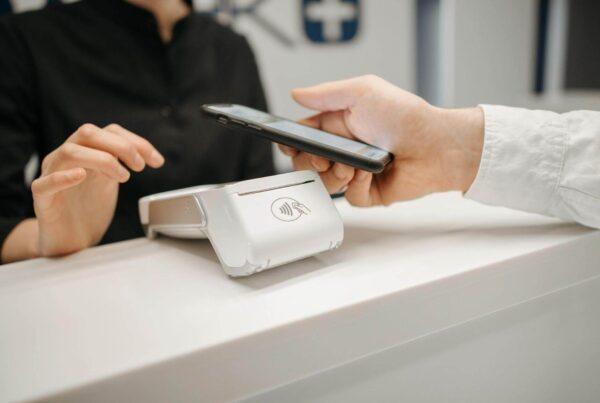Furniture inventory management software handles the stock flow, suppliers, and sales for furniture retailers, ensuring accurate data and automating many repetitive tasks to manage inventory more efficiently. To help you choose the best-fit system for your furniture store, we’ve listed here the top 7 inventory management software for the furniture industry, including:
- Magestore POS – Best for Magento and customization options;
- Square Point of Sale – Best for small businesses;
- Revel Systems – Best for feature-rich requirements;
- Rain POS – Best for ease of use;
- NetSuite – Best for a complete business solution;
- Lightspeed Retail – Best for retail sector businesses;
- Agiliron – Best for multichannel businesses.
Let’s dive into the detail of each furniture store inventory software.
7 best furniture inventory management software
1. Magestore POS – Best for customized Magento omnichannel

Magestore POS for furniture stores is specifically designed for Magento retailers who want to go omnichannel and connect all sales channels seamlessly. It helps store owners simplify their operations and centralize all data in the Magento backend. Their PWA technology lets you access the software from any device and browser, creating flexibility and security for any business in any retail environment.
Magestore POS goes with its built-in furniture inventory management system. Here are the key benefits of its inventory features:
Centralize data in Magento core:
- Sync all data in Magento database, including product information, inventory, customers, loyalty program and promotion, and sales order management;
- Update inventory level after an item is sold in real time;
- Manage multiple sales channels with salable quantity at ease.
Manage accurate stock and organized warehouses:
- Track actual quantity in physical warehouses;
- Have barcode management or serial numbers to control thousands of product SKUs effectively, including generating and printing barcodes, scanning barcodes when checkout, receiving products, or stocktaking;
- Sync multi-channel and multi-location inventory;
- Inventory counts to determine inventory cycle;
- Inventory tracking to record stock on hand, transfer items among locations, and adjust stock;
- Low-stock alerts.
Create, track, and fulfill orders across channels and locations:
- Track customer order history on the POS screen or in the Magento backend;
- Create and manage backorder for out-of-stock items;
- Handle order fulfillment with 5 simple steps: verify, prepare, pick, pack, and deliver;
- Dropship option with supplier accounts and listing pages, easily request, confirm, and create a shipment.
Demand-driven purchasing:
- Purchase and manage products from different brands;
- Inventory forecast to reorder stock based on your sales velocity;
- Create a purchase order from supply-need predictions;
- Complete purchasing activities from a centralized system, including selecting suppliers and products, generating and confirming quotations, tracking purchase order status, receiving and transferring goods to a warehouse, and returning products to suppliers.
Complete inventory reports:
- Minimize inventory costs by promoting bestsellers and eliminating worst-selling items;
- Monitor cost of goods sold (COGS) to measure profit margin;
- Reduce the risk of overbuying and understocking;
- Save time for accounting and stock value audits.
Pros
| Cons
|
Pricing Contact the Magestore team for a custom quote. Depending on your goals, business scale, and unique needs, Magestore will design a customized solution for you. Magestore offers a one-time payment model with a 90-day money-back guarantee. The best part is that it doesn’t charge any extra for more users or devices. You can trust Magestore to upgrade and scale up with you as you expand. | |
2. Square Point of Sale – Best for small businesses

Square Point of Sale is a popular mobile POS system integrated with furniture inventory software that is flexible for any business type, from furniture stores to apparel, bakeries, and coffee shops. Key capabilities of Square include inventory tracking, online payment processing, eCommerce, digital receipts, email and SMS marketing campaigns, sales reports, customer analytics, and more.
For inventory management, Square POS covers most of all basic features for your furniture retail store:
- Manage inventory from any device;
- Import products via CSV and create item categories with unlimited items;
- Edit names, prices, and quantities at any time;
- Create items from Global Trade Item Number (GTIN);
- Inventory counting tool to ensure accurate data;
- Stock alert emails notify retailers of items that are running low or out-of-stock;
- Export inventory levels to printable spreadsheets;
- Cross-location stock counts and bulk transfers;
- Smart stock forecasts for future demand;
- Automatic purchase orders when the stock reaches a certain level;
- Barcode printing based on GTIN and SKU;
- COGS measuring;
- Vendor management and evaluation.
Pros
| Cons Square Inventory works for basic retail businesses with a simple supply chain. It offers limited functionalities such as:
|
Pricing Square's pricing is simple for all-sized businesses with 3 plans:
Processing rate per transaction starts at 2.5% + 10¢ for in-person payments, and 2.9% + 30¢ for online payments. | |
3. Revel Systems – Best for feature-rich requirements

Revel Systems is a robust cloud-based business POS platform designed to maximize stability, security, ease of use, and service delivery. It best suits multi-location businesses thanks to a wide range of powerful functionalities that deal with furniture inventory tracking software, customer relationship management, automated ordering, employee scheduling, and detailed reporting. All features are connected in a single dashboard, therefore removing the need for additional software.
Revel’s furniture inventory software synchronizes data from all in-store and eCommerce channels, providing you with real-time inventory data. Here are the key features of Revel’s inventory management software:
- Manage complex matrix inventories by organizing your items into categories and easily locating each one;
- Get a granular display of thousands of items by size and color in your inventory system;
- Real-time tracking of your inventory down to the ingredient level;
- Update inventory counts;
- Scan and manage your inventory with your phone as a handheld barcode scanner to record accurate inventory data;
- Set up alerts to inform you when items are running low;
- Automatically generate purchase orders and send them to your vendors to ensure stock never runs out;
- Track historical sales numbers to fine-tune your inventory and ordering process.
Pros
| Cons
|
Pricing The price starts at $99/month per terminal with a commitment of 3 years and a flat processing fee. | |
4. Rain POS – Best for ease of use

Rain POS is an all-in-one point-of-sale, website, and marketing software for retailers to automate their business operations. It provides omnichannel retail management and POS features that can track rentals, manage inventory, generate marketing text messages, and utilize social media to promote your brand. Rain POS offers comprehensive furniture inventory management software, customized website design, multiple-user access, various templates, and an enhanced point-of-sale terminal.
Key inventory features of Rain POS furniture retail software include:
- Centralize inventory for in-store and online shops in real time with multi-store capability;
- Automate data backups of sales and inventory;
- Invoicing features with online payments;
- Check and update inventory, make sales, process rentals or work orders from any device;
- Manage serialized inventory, unlimited SKUs, and purchase orders;
- Integrate vendor catalogs with product images to save time on data entry;
- Consignment management.
Pros
| Cons
|
Pricing Contact the Rain POS team for pricing details. | |
5. NetSuite – Best for a complete business solution

NetSuite is a complete, cloud-native business management solution that digitizes all core processes of order processing, inventory and supply chain management, accounting, and production. It offers business owners real-time visibility of their operational data and financial performance. NetSuite is ideal for rapidly growing companies that seek a solid financial management system with scalability as the business expands.
For furniture inventory software, NetSuite Inventory Management package gives you a single, real-time view of stock across all locations and sales channels. The most outstanding inventory management functions of NetSuite are:
- Automate inventory tracking across multiple locations using lot and serial tracing;
- Get real-time, company-wide visibility on inventory across all functions and channels, including warehouses, retail stores, online shops, pop-up shops, drop shippers, 3PLs, etc. This is an efficient and cost-effective way to get the latest, consistent inventory data;
- Calculate the optimized inventory amount on hand to reduce unnecessary storage costs while avoiding stockouts;
- Demand-based replenishment planning: NetSuite analyzes historical sales data and average lead time to recommend the optimal reorder points for each item;
- Automatically generate tasks and alerts for the purchasing team when it’s time to restock;
- Cycle counting lets you execute automatic inventory counts without freezing transactions in the entire store during the process;
- Multi-location fulfillment lets you monitor stock levels to sell and transfer inventory between locations to optimize inventory availability and prevent obsolete stock in 1 place;
- Intelligent fulfillment reduces handling expenses and shipping costs.
Pros
| Cons
|
Pricing Contact the RaiYou can contact NetSuite for a custom quote. Your cost depends on various factors:n POS team for pricing details.
| |
6. Lightspeed Retail – Best for retail sector businesses

Lightspeed Retail is a cloud-based POS platform that is used worldwide in different industries such as furniture, apparel, footwear, home decor, jewelry, pet, sporting goods, etc. Lightspeed stands out for its robust and granular inventory management features. It can handle large quantities of merchandise and provide in-depth inventory reports with key takeaways, suggestions, and instructions to interpret the data.
Let’s explore the robust features of Lightspeed’s furniture inventory management software:
Manage inventory in multiple channels:
- Track inventory levels and SKUs across locations, both online and offline;
- Create and manage product attributes like sizes, colors, materials, etc.;
- Assign unique serial numbers for your items to identify the stock location from a single search;
- Customizable matrix inventory.
Order goods right from the inventory system:
- Built-in purchase ordering features let you order directly from Lightspeed Retail;
- Manage purchasing status for multiple stores;
- Fulfill and deliver special orders to customers;
Manage products and prices:
- Upload new products instantly via the product import tool;
- Adjust prices for all channels at once with bulk pricing rules;
- Use price books to create special pricing and loyalty reward amounts;
- Track unit costs.
Take control of your inventory:
- Real-time low stock alerts let you know the reorder points to avoid out-of-stocks;
- Easy-to-use inventory counting tools to prevent inventory shrinkage;
Barcode generator;
Make custom reports to analyze specific product sectors and customers.
Pros
| Cons
|
Pricing Lightspeed offers pricing plans as follows:
The present rate of Lightspeed Payments Card is 2.6%+ 10c for the first 3 plans and customized for the last one. | |
7. Agiliron – Best for multichannel businesses

Agiliron is another furniture inventory management software that is integrated into a cloud-based POS solution. It is designed to serve multichannel businesses running both physical and online stores. The system offers a suite of POS features such as inventory management, order management, customer support, email marketing, and many more.
Agiliron’s inventory management feature allows shop owners to control their inventory in real-time across all channels such as online, in-store, and 3rd party marketplace inventory, all from 1 database.
Some notable functions of Agiliron inventory management in the furniture industry are:
- Price books for different segmentations based on products, customers, and channels;
- Update product information, quantity, and pictures in a single database;
- Channel management to turn on definition and configuration of all sales channels;
- Capture real-time transactions data from all channels and update inventory level accordingly;
- Order fulfillment facilitates the process of picking, packing, and shipping;
- Accounting module integrates with QuickBooks;
- Purchasing module manages your supply chain;
- Manage products with bin locations, hierarchical product categories, custom attributes, matrix items – style SKUs, serialized inventory, lot tracked inventory;
- Support multi-stock locations and allow inventory transfer;
- Product customizations such as gift-wrapping options, engraving text, or gift-wrapping messages;
- Multi-channel inventory tracking and auto-sync;
- Scan on receipt and scan to pack slip;
- Order management based on the fulfillment stage;
- Shipping label generation.
Pros
| Cons
|
Pricing Agiliron has 3 packages suitable for different business sizes:
| |
Common features of furniture store POS and inventory software

Above are the top retail furniture inventory software, and each software has its strengths and main focus. If you’re starting your furniture business and seeking a suitable POS system, here’s the list of must-have features to consider:
Omnichannel sales
- Ability to sell anywhere: websites, apps, brick-and-mortar stores, marketplaces, social media, etc.;
- Sync inventory and sales data across all channels;
- Gather all data in a single backend;
- Manage an eCommerce site with responsive design and a smooth user journey from searching, viewing products, adding to cart, and checkout;
- Support different sales approach: O2O, click and collect, etc.;
- Fulfill orders with shipping tools;
- Easy to return and exchange products;
- Create backorder and special orders for custom items;
Payment processing
- Support different types of payment methods: cash, credit cards, debit cards, contactless payments, split bills, etc.;
- Mobile handheld POS terminals like smartphones and tablets;
Inventory management
- Product management: barcodes, SKUs, serial numbers;
- Multi-store management;
- Inventory transfer;
- Low-stock alerts;
- Inventory forecasting;
Purchasing and supplier management
- Generate POs automatically at reorder points and send them to vendors;
- Manage vendor performance: quality, price, delivery time, etc.;
Customer management
- Create and view customer profiles, and transaction history;
- Loyalty programs, gift cards, and marketing campaigns;
Employee management
- Monitor employee performance and schedule;
- Track commissions and split commissions by sales team;
Customized reports and analytics for insights
- Sales reports;
- Inventory reports;
- Customers reports;
- Financial reports;
- Employee reports;
Market trends of furniture POS and inventory software

POS and furniture inventory control software keeps evolving to better serve the fast-changing retail landscape. Here are the top POS market trends that are shaping the future of retail businesses:
Untethered POS systems
POS systems are no longer tied to 1 checkout counter location. Now you can use mobile POS systems (mPOS) with handheld devices to interact with customers, look up items, and complete sales. With mPOS, customers can also order for delivery, or order online and pick up in-store.
Seamless omnichannel experiences
Omnichannel isn’t new, but POS technologies continue to empower business owners to create a more seamless shopping experience across all touchpoints. Customers prefer consistent experiences no matter where they interact with your brand, from eCommerce stores to brick-and-mortar shops, social media, or marketplaces. All data of customers and sales from all channels are centralized in a unified platform for analytics and insights.
Alternative payment methods
POS systems are accepting more payment methods, creating the convenience for customers to pay in their favorite way. Apart from traditional cash, debit, and credit cards, now POS software allows mobile payments, buy now pay later, installation payments, split bills, gift cards, loyalty programs, etc.
Personalized shopping experiences
Personalization can boost customer satisfaction and loyalty, and in turn increase your revenue from returned customers. POS systems help you achieve this by capturing customer information and behaviors, so you can build customer profiles and deliver personalized content, and product suggestions, or execute marketing ideas for different customer segments.
Data analytics
Besides customer data, the POS can collect and reveal information about other business aspects, including inventory, products, store layout, foot traffic, return rates, staff performance, and more. These metrics will help you make better decisions, such as determining the best sellers and the reorder points, forecasting demand, making pricing strategies, improving store design, and setting up winning promotion campaigns, etc.
Cloud-based software
The trend of POS systems moving to the cloud is increasing, with almost all top POS providers now offering the option for cloud-based systems. This technology allows more security, less storage space for businesses, and more affordable pricing. It is also easy to access the software from any device and get updated versions of the POS.
Upgraded POS hardware
Retailers are switching from traditional cash registers toward more mobile, business-friendly hardware like smartphones and tablets, barcode scanners, receipt printers, and cash drawers. Other POS hardware trends are the decline of swipe transactions, the rising of Bluetooth, self-checkouts, electronic shelf labels, and pickup lockers.
Cost-saving subscriptions
Many POS providers offer subscription plans to create more flexibility for customers to choose their best-match plan with an affordable monthly fee, and the ability to upgrade to a more premium plan if they want to scale up.
Integrated loyalty programs
You can set up and manage loyalty programs right from your POS system. In this way, you can monitor if your program is getting more customers to come back, whether the customers are happy with the program, and how it affects your profit.
FAQs
What is furniture inventory?
Furniture inventory is the process of organizing items into categories and locations, tracking the movement of goods, and monitoring the changes in your warehouse. It determines the reorder point to stock up sufficient inventory to meet customer demand while optimizing storage costs.
What are furniture store POS and inventory software?
Furniture store POS and inventory system provides real-time visibility into your inventory management and sales performance, and controls your supply chain from purchasing to warehousing, and shipping to customers.
Which inventory software is best?
Each business has different needs, so there’s no retail furniture software that can fit it all. If you are a small business with a basic need for inventory, Square POS will do with reasonable pricing. If you’re growing and need more advanced solutions, consider Revel or Lightspeed. If you’re a big enterprise seeking a complete solution for business management, check NetSuite. If you’re looking for a fully customizable, omnichannel, Magento-native solution regardless of your company size, Magestore will be your best choice.














